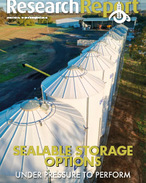This article is 5 years old. Images might not display.
Colder conditions since March - in comparison with 2019 - are likely to have slowed aphid population growth during establishment and early crop tillering stages.
"This is fortunate, because RWA growth rates are also influenced by plant growth stage, with younger plants supporting faster aphid reproduction than older plants," Jessica Lye from research organisation cesar said.
"If there is wet weather during late winter and spring, as predicted by the Bureau of Meteorology, this is also likely to suppress RWA," Dr Lye said, whose work is supported through a Grains Research and Development Corporation investment.
Despite this outlook, monitoring and making threshold-based decisions remains key to effective long-term management of this aphid.
"Growers and agronomists are advised to monitor for RWA during tillering and stem elongation, keeping in mind current recommended thresholds if they observe any infestations," Dr Lye said.
Australian intervention thresholds are currently based on overseas advice, which recommends a spray application when more than 20 per cent of all seedlings are infested with aphids up to growth stage 30 and more than 10 per cent of tillers are infested with aphids from growth stage 30.
Through research investments by the GRDC, being led by the South Australian Research and Development Institute (the research division of Primary Industries and Regions SA) and cesar, a biological and ecological profile of RWA is being developed to provide grain growers with scientifically robust management tactics for the future, including economic thresholds for Australian farming systems.
A RWA resource portal which includes updates on current research efforts and the latest RWA management advice, hosted by cesar, is available at http://bit.ly/2Px67tu.
In the meantime, growers and advisers are encouraged to report to the GRDC-supported PestFacts south-eastern (co-ordinated by cesar) any detections of invertebrates (pest/beneficial/unknown) in crops and pastures. PestFacts details are available at https://bit.ly/3j7oVQb























